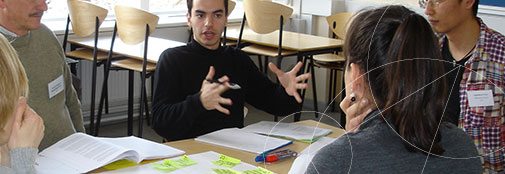
Educational design in mathematics and science: The collective aspect
Department of Science Education, University of Copenhagen
This international doctoral course will give you an introduction to studying the collective aspects of designing, implementing, and evaluating science education. The recent work of several international scholars will be presented, including examples from a variety of science disciplines, and both formal and informal science education contexts. The taught course will be supplemented by readings of recent research papers prior to, during, and after the course.As a result of attending the course, you will:
- Acquire a solid foundation in the recent advances in theoretical and empirical research on the collective aspects of science and math education,
- Develop the ability to recognise and validate problems within this domain, and
- Acquire an understanding of relevant research methodologies and techniques and their application within this domain.
- Gain experience writing scientific, peer-reviewed manuscripts (that can be developed further into publications at the participants’ own initiative).
Requirements
Prior to the course, participants will be required to submit a 5-page synopsis of their own research, providing a preliminary analysis of how the course problematique applies to their case(s). During the course, participants will continue to develop their ideas under the supervision of the course teachers and guest professors. Finally, the participants are required to submit a 10-page paper, selecting and using appropriate methodologies from the course and course readings in their own research. This paper will undergo peer review (by the other participants and the course teachers).
Background
Collaboration is at the heart of didactic phenomena related to mathematics and science. Trivially, didactic situations always include a multiplicity of participants whose interaction is crucial to the outcome in terms of (changed, increased) knowledge among at least some of the participants. Less evident - but highly emphasised in recent research - is the role of collaboration in the planning of teaching sequences or exercises, the conception of exhibitions, textbooks, and other educational materials.
Course content
In this course we will consider theoretical issues of addressing collective aspects of didactic phenomena, including the various conceptualizations of what constitutes a ‘collective’, the positions with the collective under investigation, its genesis, and the implications of this for didactical research. Methodological challenges will also be considered explicitly in these contexts. This course will merge, for the first time, research perspectives on collective aspects of education from mathematics and science in both in-school and out-of-school contexts, providing participants with updates on the latest international research and identifying avenues for future investigations.
This course will start by giving participants a basic introduction to the different theoretical and empirical approaches to studying the collective aspects of mathematics and science. It will then present a number of recent studies and cases, based on the work of international. These studies will include examples from a variety of math and science disciplines, and both formal and informal science education contexts. They will be presented in a variety of formats, e.g. lectures, workshops, group discussions. The taught course will be supplemented by readings of recent research papers.
More information
Participants
Doctoral students in science and math education research
Dates
November 16-20, 2015 (5 days, full time)
Location
Copenhagen (specific venue to be announced)
Language
English
Workload
Preparation/self-study 35 hrs; Course presence 35 hrs; Evaluation/reporting 70 hrs; Total 140 hrs corresponding to 5 ECTS
Teachers
Professor Carl Winsløw (University of Copenhagen)
Associate Professor Marianne Achiam (University of Copenhagen)
Lecturers
Professor Marianna Bosch (Ramon Llull University, Spain)
Professor Dagny Stuedahl (Norwegian University of Life Sciences)
Fee
The course is free of charge, and lunch is included. Participants must secure their own travel expenses as well as room and board.
Registration
Please register by uploading one page description of your current research or development project and a one page CV no later than September 1st. Register here.
Applicants will be informed of their acceptance by September 5th. There is a limit of 15 doctoral students.
Contact info
For additional information about the course, please contact course secretary Charlotte Bukdahl Jacobsen (cja@ifro.ku.dk) or course responsible Marianne Achiam (achiam@ind.ku.dk)
